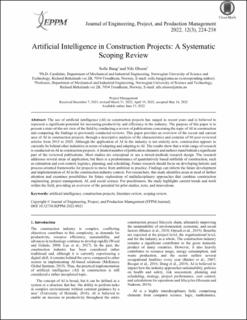| dc.contributor.author | Bang, Sofie | |
| dc.contributor.author | Olsson, Nils | |
| dc.date.accessioned | 2022-12-05T09:21:24Z | |
| dc.date.available | 2022-12-05T09:21:24Z | |
| dc.date.created | 2022-09-05T11:32:56Z | |
| dc.date.issued | 2022 | |
| dc.identifier.citation | Journal of Engineering, Project, and Production Management. 2022, 12 (3), 224-238. | en_US |
| dc.identifier.issn | 2221-6529 | |
| dc.identifier.uri | https://hdl.handle.net/11250/3035793 | |
| dc.description.abstract | The use of artificial intelligence (AI) in construction projects has surged in recent years and is believed to represent a significant potential for increasing productivity and efficiency in the industry. The purpose of this paper is to present a state-of-the-art view of the field by conducting a review of publications concerning the topic of AI in construction and comparing the findings to previously conducted reviews. This paper provides an overview of the recent and current uses of AI in construction projects, through a descriptive analysis of the characteristics and contents of 86 peer-reviewed articles from 2015 to 2020. Although the application of AI in the industry is not entirely new, construction appears to currently be behind other industries in terms of adopting and adapting to AI. The results show that a wide range of research is conducted on AI in construction projects. A limited number of publication channels and authors stand behind a significant part of the reviewed publications. Most studies are conceptual or use a mixed-methods research design. The research addresses several areas of application, but there is a predominance of quantitatively based subfields of construction, such as estimation and cost control, logistics, planning, and scheduling. Future research should focus on developing holistic and process-oriented frameworks for projects to move from ambition to practice. Findings can inform the future development and implementation of AI in the construction industry context. For researchers, this study identifies areas in need of further attention and examines possibilities for future exploration of multidisciplinary approaches that combine construction engineering, project management, AI, and social science. For practitioners, the study highlights current trends and work within the field, providing an overview of the potential for pilot studies, tests, and innovations. | en_US |
| dc.language.iso | eng | en_US |
| dc.publisher | EPPM-Journal | en_US |
| dc.rights | Attribution-NonCommercial-NoDerivatives 4.0 Internasjonal | * |
| dc.rights.uri | http://creativecommons.org/licenses/by-nc-nd/4.0/deed.no | * |
| dc.title | Artificial Intelligence in Construction Projects: A Systematic Scoping Review | en_US |
| dc.title.alternative | Artificial Intelligence in Construction Projects: A Systematic Scoping Review | en_US |
| dc.type | Peer reviewed | en_US |
| dc.type | Journal article | en_US |
| dc.description.version | publishedVersion | en_US |
| dc.source.pagenumber | 224-238 | en_US |
| dc.source.volume | 12 | en_US |
| dc.source.journal | Journal of Engineering, Project, and Production Management | en_US |
| dc.source.issue | 3 | en_US |
| dc.identifier.doi | 10.32738/JEPPM-2022-0021 | |
| dc.identifier.cristin | 2048823 | |
| cristin.ispublished | true | |
| cristin.fulltext | original | |
| cristin.qualitycode | 1 | |

